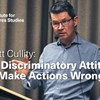accessed
Bo Rothstein: A social science dilemma. Is there a contradiction between democracy and quality of government?
Research seminar with Bo Rothstein.AbstractMost definitions of democracy rely on a set of procedural rules for how political power should be accessed legitimately. The basic norm for these procedural ru realized by equal democratic rights. In this understanding of political legitimacy, democracy is a “partisan game” where various interests are given fair possibilities to compete for political power. The concept of “quality of government” relates to the legitimacy in the of political power and is based on the norm of that is the opposite of partisanship. This is to be realized by, for example, the rule of law and a public administration built on meritocracy. Several tensions between these two bases for achieving political legitimacy will be present. For example, a democratically elected government may want to politicize the public administration and may establish public services and benefits directed only to their political supporters. The rule of law includes the principle of equality before the law, but a democratically elected government may take actions that put itself “above” the law. Various empirical measures and philosophical principles for understanding these type of tensions between democracy and the quality of government will be presented in this lecture.

Bo Rothstein: Is there a contradiction between democracy and quality of government?
Most definitions of democracy rely on a set of procedural rules for how political power should be accessed legitimately. The basic norm for these procedural rules is according to noted democracy theor

World Values Survey
World Values Survey is a global research network studying trends in values all over the world. Their secretariat is located at the Institute for Futures Studies.
Environmental Co-governance, Legitimacy, and the Quest for Compliance: When and Why is Stakeholder Participation Desirable?
Journal of Environmental Policy and Planning, 18 (3), 306-323. Abstract Deliberative forms of stakeholder participation have been widely embraced as a key measure for addressing legitimacy deficits and
Safety requirements vs. crashing ethically: what matters most for policies on autonomous vehicles
AI & Society, https://doi.org/10.1007/s00146-020-00964-6 Abstract The philosophical–ethical literature and the public debate on autonomous vehicles have been obsessed with ethical issues related to c
Olle Hammar: Rethinking Global Wealth Inequality: The Role of Human Capital
Venue: Institutet för framtidsstudier, Holländargatan 13, 4th floor, Stockholm, or online.Research seminar with Olle Hammar, Ph.D. in Economics and researcher at the Institute for Futures Studies. RegistIn this paper, we introduce novel estimates of wealth inequality, integrating the standard household wealth concept with newly assessed individual human capital. Using microdata and national accounts from numerous countries since 2000, we explore the distribution across age, gender, education, and occupation. Our analysis reveals two key findings: 1) human capital is more evenly distributed than financial capital, and 2) total wealth, the sum of human and financial capital, is significantly more equal than financial wealth alone. This study offers a groundbreaking perspective on global wealth dynamics, emphasizing the critical, yet often overlooked, role of human capital in wealth distribution.
How do we measure well-being?
Stella lives with her family in a villa in a medium-sized town in Sweden. She likes her job but her back is hurting. How do we measure her well-being? Increasing well-being is generally accepted as one
Predicting how US public opinion on moral issues will change from 2018 to 2020 and beyond
Royal Society Open Science, vol. 9, issue 4 Abstract The General Social Survey, conducted every 2 years, measures public opinion on a wide range of moral issues. The data from the 2020 survey are expect
Public services demokratiska uppdrag. Fri åsiktsbildning och offentligt förnuft
Statsvetenskaplig Tidskrift 126:2, 355–372 Abstract The democratic significance of public broadcasting corporations has gained renewed urgency as a result of developments in the outside world and the ong

Garrett Cullity: How Discriminatory Attitudes Can Make Actions Wrong
Research seminar with Garrett Cullity, professor of philosophy at the Australian National University, known for his research on moral philosophy. Abstract In general, otherwise permissible actions do








